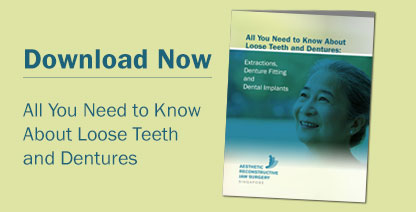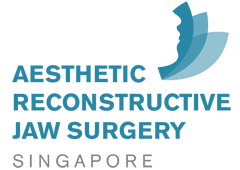Share this
Dental Implants Singapore Process: Post-Operative
on May 29, 2014
 Are you planning to replace missing teeth or loose dentures with dental implants? Singapore patients who decide to go with implant-based dental restorations are typically very pleased with the end result. However, the means of getting to those results – the dental implant process – may seem a bit intimidating for patients who haven't had previous experience with it. One of the more frequent questions Singapore oral surgeons hear concerning that process is what they can expect in the post-operative phase, after their dental implant placement procedure. Here, we'll go over the details of the post-operative period for the average patient.
Are you planning to replace missing teeth or loose dentures with dental implants? Singapore patients who decide to go with implant-based dental restorations are typically very pleased with the end result. However, the means of getting to those results – the dental implant process – may seem a bit intimidating for patients who haven't had previous experience with it. One of the more frequent questions Singapore oral surgeons hear concerning that process is what they can expect in the post-operative phase, after their dental implant placement procedure. Here, we'll go over the details of the post-operative period for the average patient.
Getting Home After Surgery
The first thing you should know is that your implant placement surgery will be done under anesthesia. Most common IV sedation along with a local numbing agent, a combination that offers a comfortable, pain-free experience. If you have IV sedation, you'll need to be sure you have a means of getting home after your procedure. Sedatives used in IV sedation can impair reflexes and depth perception for several hours, making driving unsafe.
The First Few Days
Immediately following the surgical placement of dental implants, Singapore oral surgeons recommend rest – preferably bed rest – for the remainder of the day. Too much activity after surgery can increase bleeding from your surgical sites. During the first 24 to 48 hours, some oozing of blood is to be expected, but heavy bleeding or bleeding that continues after 48 hours should be brought to your oral surgeon's attention. Additionally, if you've had dental implants placed in the upper jaw, you may experience a nosebleed within the first few days after surgery.
You can expect some facial swelling and bruising after dental implant surgery. To minimize swelling, you'll be instructed to elevate your head about 30 degrees as you're lying down, which can be done with the use of two or three pillows. Applying ice packs to your face during the first 24 hours can also help – but don't leave them on for more than 20 minutes at a time. Once that 20 minutes has passed, give your face a 20 minute break before applying ice again.
You may experience some pain and stiffness once the affects of anesthesia have worn off. Most patients have no trouble controlling pain and discomfort with pain medications. Your Singapore oral surgeon will typically provide a prescription for pain medication to keep you comfortable during those first few days, and often, antibiotics to aid in preventing infection. Be sure to take these medications exactly as prescribed. Typically, pain, swelling and bruising will improve gradually over the first 5 to 7 days after surgery.
Eating After Surgery
If you have had one, two or several dental implants placed, you will be advised to avoid chewing over the implants for 3 to 6 months to avoid disrupting the bonding process, called osseointegration, between implant and jawbone. Soft foods are recommended for at least the first week, and very hot foods or liquids, as well as acidic foods or grainy ones should be avoided, since they can irritate surgical sites. If you are undergoing dental implant treatment to replace all of your teeth in one jaw or both, limiting yourself to a soft diet throughout the osseointegration period is recommended.
Lastly, good oral hygiene is essential after placement of dental implants. Singapore oral surgeons provide detailed instructions on caring for the mouth after surgery. Follow those instructions carefully, since they will help reduce your risk of post-surgery complications and help ensure your implants will become a strong, stable foundation for your brilliant new smile.
Share this
- Jaw Surgery (93)
- Dental Implants Singapore (90)
- Orthognathic Surgery (48)
- Replacing Missing Teeth (26)
- Missing Teeth Options (23)
- Underbite (23)
- Bone Grafting (21)
- Costs (18)
- Facial Aesthetics (18)
- Aesthetics (17)
- dental implants (16)
- corrective jaw surgery (15)
- BOTOX (11)
- Dermal Fillers (11)
- Wisdom teeth (10)
- Fixed Implant Dentures (8)
- Loose Dentures Singapore (6)
- Medisave (6)
- sleep apnea (6)
- Braces (5)
- Dental Pain (5)
- Dentures in Singapore (5)
- Loose Teeth (5)
- Tooth Extraction (5)
- jaw deformities (5)
- bimax (4)
- bone graft (4)
- maxillomandibular advancement (4)
- all-on-4 (3)
- bimaxillary protrusion (3)
- chin implant (3)
- facial asymmetry (3)
- full mouth dental implants (3)
- genioplasty (3)
- immediate implant (3)
- removal of an integrated dental implant (3)
- third molars (3)
- wisdom tooth surgery (3)
- My Dentures Don't Fit (2)
- VME (2)
- bone graft healing (2)
- distraction osteogenesis (2)
- medical tourism (2)
- obstructive sleep apnea (2)
- orthodontics (2)
- plastic surgery (2)
- CT guided dental implants (1)
- Double jaw surgery (1)
- Invisalign (1)
- Periodontal Disease (1)
- Permanent Dentures Singapore (1)
- before and after photos (1)
- facial trauma (1)
- fractured dental implant (1)
- oral appliance therapy (1)
- root canal treatment (1)
- veneers (1)
- vertical maxillary excess (1)
- September 2019 (2)
- July 2019 (2)
- May 2019 (2)
- August 2018 (1)
- October 2017 (1)
- September 2017 (2)
- August 2017 (1)
- June 2017 (2)
- May 2017 (4)
- April 2017 (1)
- March 2017 (1)
- February 2017 (3)
- January 2017 (3)
- December 2016 (1)
- November 2016 (2)
- October 2016 (4)
- September 2016 (9)
- August 2016 (5)
- July 2016 (11)
- June 2016 (14)
- May 2016 (6)
- April 2016 (2)
- March 2016 (1)
- January 2016 (7)
- December 2015 (10)
- November 2015 (4)
- October 2015 (9)
- September 2015 (7)
- August 2015 (1)
- July 2015 (6)
- June 2015 (3)
- May 2015 (7)
- April 2015 (5)
- March 2015 (8)
- January 2015 (5)
- December 2014 (7)
- November 2014 (7)
- October 2014 (6)
- September 2014 (8)
- August 2014 (5)
- July 2014 (7)
- June 2014 (8)
- May 2014 (9)
- April 2014 (10)
- March 2014 (6)
- February 2014 (8)
- January 2014 (3)
Subscribe by email
Email subscription




No Comments Yet
Let us know what you think